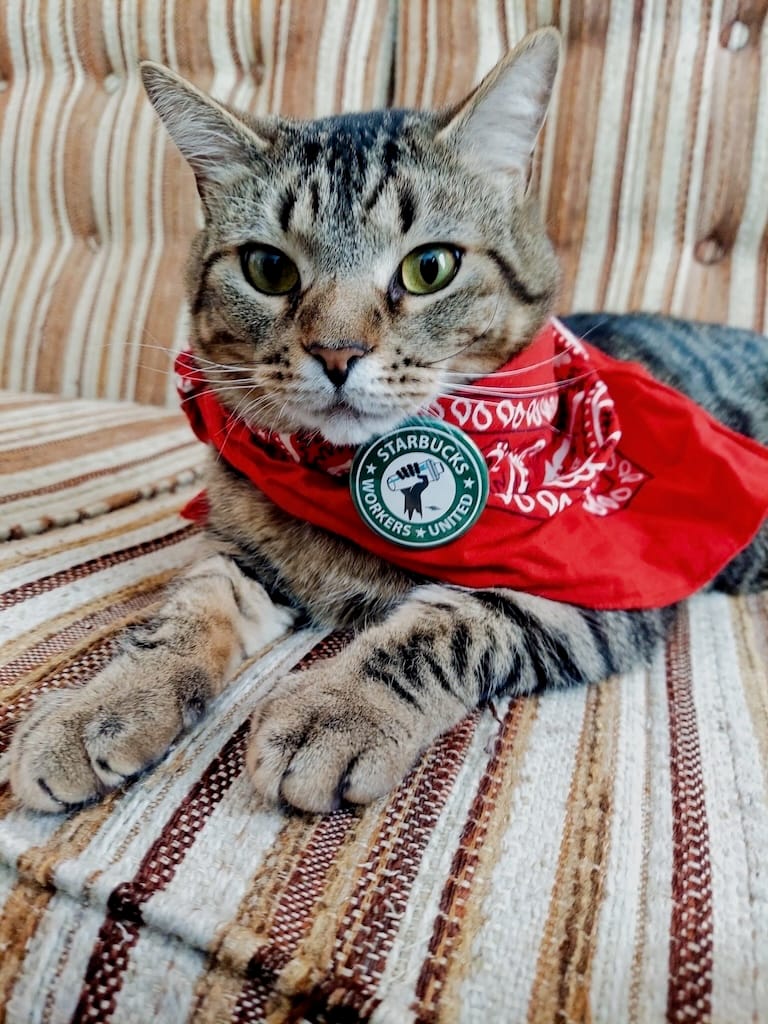“Every Workplace is Organizable”: Jaz Brisack on Starbucks, Salting, and Solidarity
At 23, Jaz Brisack was told that unionizing Starbucks was a long shot. They did it anyway.

In the sun-dappled interior of Jerusalem Coffee House, a Palestinian cafe in Oakland, Jaz Brisack, 27, orders a cardamom spiced latte with oat milk, half sweet. Brisack rarely buys coffee out these days, and prefers to frequent unionized businesses. It’s the legacy of two years spent working as a barista at Starbucks while trying to unionize the coffee giant.
When Brisack was 23, they “salted” Starbucks — getting a job at the chain with the intention of unionizing it. They helped unionize the first Starbucks store on Elmwood Avenue in Buffalo, New York, which kickstarted a vibrant, Gen-Z-led union campaign that spread across the country and revitalized a flagging labor movement. Today there are 600 unionized Starbucks stores in 40 states, although workers are still battling for a first contract.
Now, Brisack trains other organizers to become “salts” with the Insider Organizer School. Their new book, Get on the Job and Organize: Standing Up for a Better Workplace and a Better World, tells the inside story of the Starbucks union campaign. Brisack sat down with Bay Area Current to talk about “salting,” union busting, and their advice for young workers.
Decca Muldowney: How did you get involved in the labor movement?
Jaz Brisack: I've been organizing for about 10 years now. I'm originally from Texas and Mississippi. I didn't grow up with any knowledge of unions or even any idea that unions were something that really still existed. But I was a history nerd growing up, and so I learned about the history of free thought in the South, which led me to the Scopes “monkey trial”, which led me to Clarence Darrow, the lawyer who had represented the teacher, which led me to Eugene V. Debs, who was one of Darrow's clients.
I read Debs’s 1918 speech to the jury after he was convicted of sedition, and his definition of solidarity changed my life: “While there is a lower class, I am in it, and while there is a criminal element I am of it, and while there is a soul in prison, I am not free.”
I was lucky enough to find a professor at the University of Mississippi who was like: “Oh, unions still exist. You can get involved with the Nissan campaign.” That was happening in Canton, Mississippi in 2017. And so the rest followed from there. Once I found out unions existed, that was what I wanted to do.
DM: What is a “salt”?
JB: A salt is a worker who gets a job at a company with the goal of unionizing it. Most salts are volunteers, so the question of “who is a salt?” is often a question of motive. [Salting] is probably as old as the labor movement. While I was working on the Nissan campaign I read a book called Playing Against the House: The Dramatic World of an Undercover Union Organizer by James D. Walsh, who got a job as a Unite Here salt in a casino with the goal of actually writing about salting. I thought it was a fantastic book because I was like, “Oh my God, this is so cool. You can do this. I wanna do this.”
DM: How did you become a salt?
JB: I'd always wanted to do it. After Nissan, the next major campaign I worked on was SPoT Coffee. And for that campaign I ended up moving to Buffalo very spontaneously after workers got fired. My job was to try to help get fired workers’ jobs back and get a union. After we won SPoT Coffee, workers at other coffee shops, including Starbucks, started reaching out about organizing. Then one of the [Starbucks] workers, Benny, was fired. My best friend in grad school was like, “Hey, you've always wanted to salt. These people are getting fired for trying to talk about unionizing. Why don't you do it and get that experience?”
DM: Once you got on the job at Starbucks, you had to figure out if your coworkers would be interested in unionizing. You write in the book that you weren’t very successful at first. Most of your notes were about whether or not they had cats.
JB: It's true. I stand by this. I think cats are a great indicator of union sympathies.

DM: Once you were on the job, what challenges did you face trying to unionize?
JB: Turnover was a huge problem, especially with the pandemic. When I started salting, the pandemic and the tight labor market were resulting in people leaving the industry en masse and getting remote jobs, getting office jobs, trying to leave the service sector. I’d pick up a shift at a store, or I'd be working at my store, and making jokes with coworkers and then suddenly they’d say: I'm quitting. Because we were so early on and I was trying to recruit more salts and get a better sense of the whole district —so that we wouldn't just launch one store — I couldn't be like, “wait, wait, wait, don't quit, let's talk about organizing.”
DM: How did Starbucks’ union-busting impact the organizing effort?
JB: Obviously it would've been better if Starbucks had respected our right to organize and negotiated a contract in good faith. Then we might actually have a union at 10,000 stores. But instead they adopted a scorched earth union-busting model. They sent in a corporate SWAT team of executives and managers. And then, as the campaign spread, they started closing stores, firing workers, granting non-union workers the benefits that we'd been asking for at the bargaining table to try to dissuade them from unionizing, and trying to persuade unionized workers that unionizing was costing them those benefits.
But they also did really stupid things, including having Howard Schultz, the former CEO, (who would then come back as CEO) fly to Buffalo to deliver the last captive audience meeting. They closed every store in town. They brought everybody into this hotel ballroom, and Howard delivered a speech about how great Starbucks benefits were, how no one forced him to give us those benefits, how he had grown up poor and he felt the shame and scars of being poor — which he said to a room of poor people. Then he launched into his anecdotes about his trip to Israel. In Israel, he had met this rabbi who told him a story about the Holocaust and about how prisoners had been given one blanket for every five people, and they decided to share their blanket. “So much of that story is threaded into what we’ve tried to do at Starbucks,” said Howard “is share our blanket.”
On that day his net worth was estimated at $4.8 billion. Lots of people in the room were googling Howard Schultz's net worth because of this analogy. And it fell very, very flat and actually helped turn the tide back. Workers were like, what the fuck is this?
DM: How did it feel when the campaign snowballed and took on a momentum of its own, with hundreds of stores unionizing across the country?
JB: It was unbelievable. I didn't anticipate how many stores would want to unionize as quickly as they did with the company giving every indication that they were stepping up, the union busting. That was a really magical time.
DM: What happened after that?
JB: It was a slow process of attrition. Politics within the union were challenging, because what we wanted to do was run a very grassroots, very decentralized, somewhat anarchistic campaign because we didn't want overly centralized control that would prevent workers from really feeling the autonomy and the freedom to run the campaign and run their union in the way that they wanted. The international Workers United was affiliated with the Service Employees International Union (SEIU), and so we ended up having top union leadership from both Workers United and SEIU telling us that they didn't think that a boycott would work.
So there were a lot of differences of opinion. In my opinion, we should have called a boycott of Starbucks the day the Memphis seven were fired in February 2022. The top union leadership was not in favor of that. We should have had bargaining at 100 stores or 300 stores and made Starbucks and their union busting lawyers scramble around the country to go to all these bargaining sessions. But the union was more worried about control than about actually putting this pressure on the company.
I ended up sort of having parallel constructive discharge tracks — which means, you know, getting forced out slowly — from both the union campaign and Starbucks itself.
DM: What do you think are the major successes of the campaign?
JB: The Starbucks story is not over. It's still to be determined. There's still a tension between the goals of the top union leadership and the vision of the rank and file, which is much closer to what we started off with.
Some of that was encapsulated in our solidarity with Palestine. I was the person who initially tweeted Solidarity with Palestine, which was not controversial [among workers]. After I made that post Starbucks workers weren't upset that it had been made. They were upset that the top union leadership had ordered that it be deleted. So they organized to have a much stronger, more articulated statement of solidarity. And Starbucks’ retaliation against the union for supporting Palestine prompted this global boycott that actually did result in the company coming back to the bargaining table.
The problem is that Starbucks has kind of gotten off the hook for that because once they agreed to come back to the bargaining table, there was not enough urgency. The timeline has dragged out for a long time and now they’re reading the room. There’s a very different National Labor Relations Board under Trump. So they have an incentive to return to their union busting.
I think participating in the Starbucks campaign has really transformed thousands of workers' lives at this point. Not just on a work level, but on a personal level. And it's given people an understanding that work doesn't have to be like this. Here's what a different vision could look like. People will take that with them to other workplaces and future careers.
DM: What makes a good salt?
JB: We say “be normal,” kind of as a joke. But none of us are really normal because it's not a thing that you just do on a lark. I am certainly not normal, but I think you have to have empathy and be motivated by care for coworkers and for people, rather than by ideology.
We say “be normal,” kind of as a joke. But none of us are really normal because it's not a thing that you just do on a lark. I am certainly not normal, but I think you have to have empathy and be motivated by care for coworkers and for people, rather than by ideology.
I care about making a better world and ending capitalism and those kinds of things. But you can't go into the workplace and be like, “okay, we're gonna do socialism.” You have to go into the workplace and actually make friends with people. And so the best salts are humble, they aren't trying to show that they're the world's greatest revolutionary. They're actually trying to build relationships. They're doing the shitty jobs that people don't wanna do to start earning trust and respect in the workplace. But also these are people who coworkers are gravitating toward, who people wanna go get a drink with, or go on a walk with after work. You have to be likable.
DM: Bosses know all about salting, but unions and the labor movement are sometimes hesitant to talk about the tactic. What are some of the myths about salting?
JB: Companies are controlling the narrative around salting and portraying it as this schemy, nefarious — which was the word Howard Schultz used about what we did — activity instead of celebrating this as one of the best things people can do to build a labor movement.
There's nothing disingenuous about wanting to organize a union with your coworkers. And there's no guarantee that salting a workplace will result in a union. You're not going to be convincing your coworkers to do this. You can talk to them about the option of doing this, but they're either going to want to or they're not. And a salt isn't miraculously gonna turn a shop where no one has interest into a unionized environment. People have to do that themselves.
DM: Do you have any advice for young workers interested in the labor movement?
JB: Every workplace is organizable. There's no such thing as an unorganizable workplace. There's places that haven't been organized yet. That doesn't mean that every place is going to be a hot shop or organizable every moment of every day. But I think building relationships with coworkers and starting to understand what motivates people, what they want to see improve — people don't just unionize businesses when they have a problem. People unionize businesses because they want democracy in the workplace, because they want more power sharing, because they want a say in the place where they're spending most of their lives. I think everybody should know how to organize and we should normalize it. If you have a job, you should try to organize it.
If you are looking for a job or you’re dissatisfied, salting is such an amazing opportunity to plug into a really strategic, really exciting campaign and help transform what the labor movement looks like.
And if you salt, you're likely to adopt cats. I don't make the rules. It just happens.
This interview has been condensed and edited for clarity. After this interview took place, Jaz Brisack joined Bay Area Current as a labor editor.






